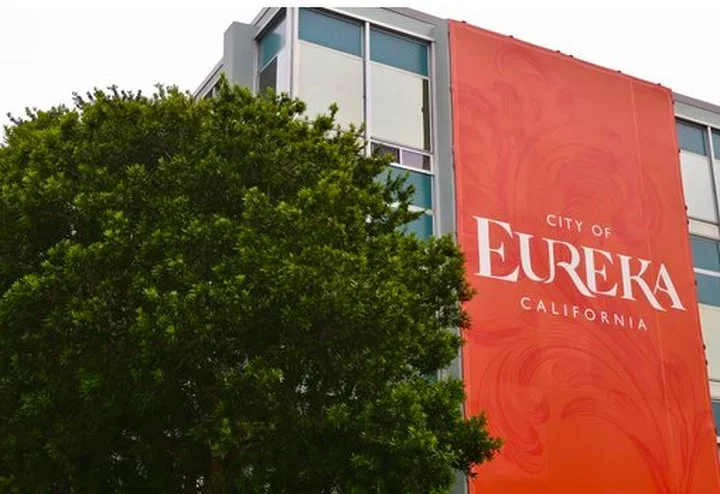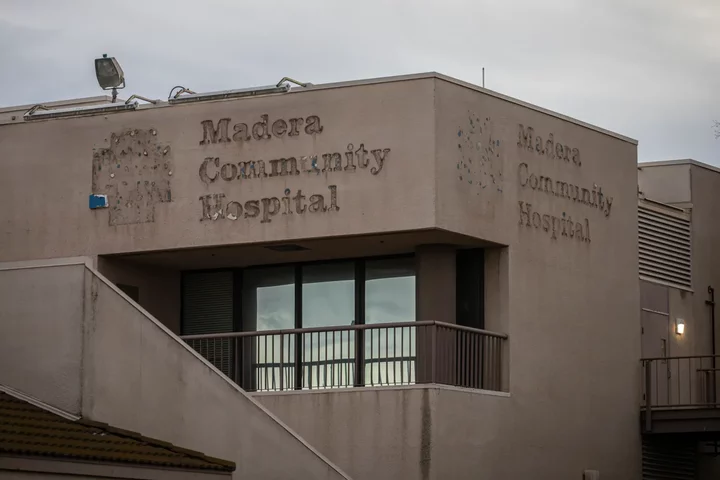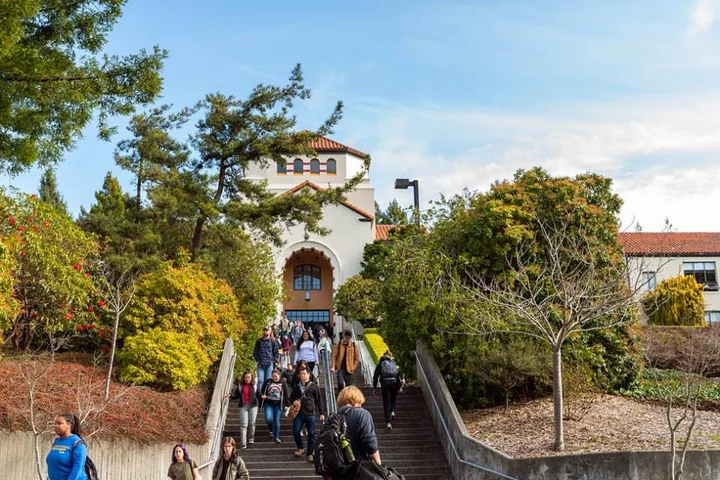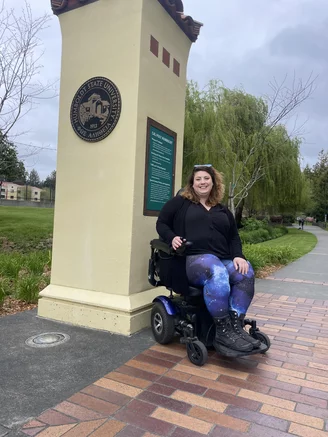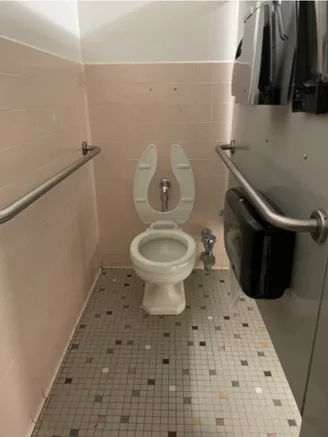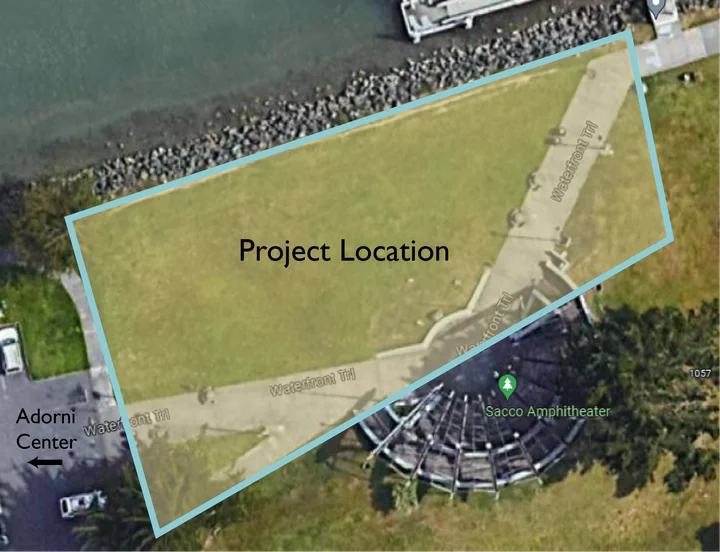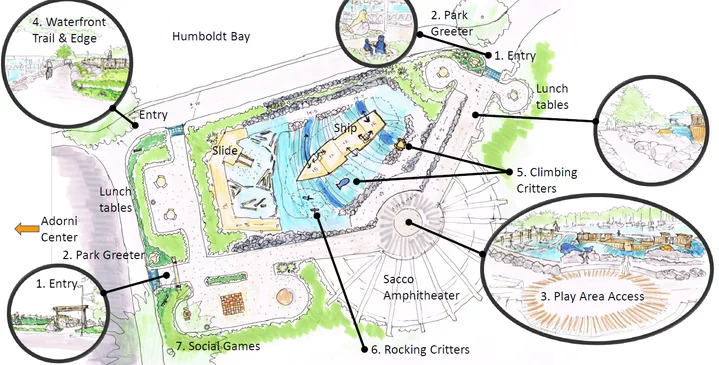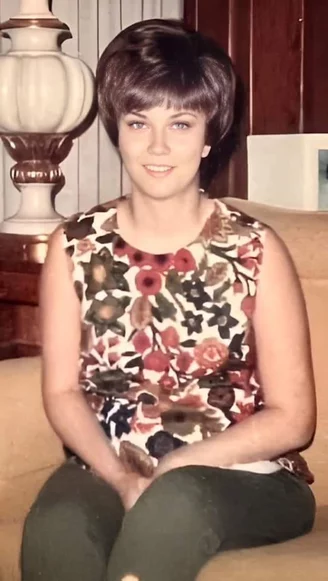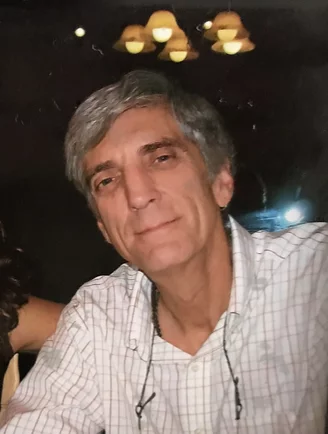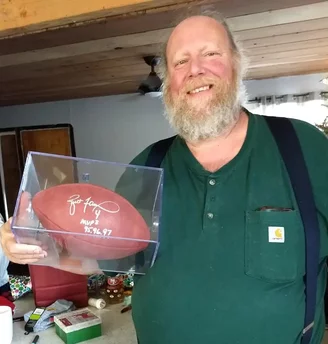What’s YOUR Vision for Eureka? Community Members Are Invited to Attend an Upcoming Strategic Visioning Workshop
Isabella Vanderheiden / Thursday, May 4, 2023 @ 2:04 p.m. / Local Government
###
Do you live in Eureka and have thoughts on the city’s goals and priorities? Or perhaps you have a vision for a project that would benefit Eureka residents? Do you have opinions? Comments? Concerns?
You’ll have a chance to share your thoughts with Mayor Kim Bergel, members of the Eureka City Council and city staff during two upcoming workshops focused on setting and implementing the city’s goals for the next few years.
The city develops a Strategic Visioning Plan every two or three years to assist the city in addressing future challenges and to give the public an opportunity to provide feedback on the city’s priorities, said City Manager Miles Slattery.
“Basically, we’ll be exploring what the community sees as priorities for the next two to five years,” Slattery told the Outpost. “We’re working with Berké Brown, one of the consultants who worked with us on the city’s diversity, equity and inclusion work. He will be leading the strategic visioning process. … We’re hoping to get as much participation as possible.”
The workshops will begin with a public comment period, which will be followed by a brainstorming and breakout group session. During the city’s last strategic visioning session, this process involved lots of sticky notes on a whiteboard, Slattery said.
“We basically developed a laundry list of goals and priorities and then looked at different factors to determine whether there was adequate funding or if there’s enough staffing to do whatever is being proposed,” he said. “If there’s enough staffing and if there’s adequate funding and the resources to do it, then that stays on the board.”
Once the visioning process is complete, city staff will synthesize the information and create initiatives to meet the community’s goals.
The workshops will take place at 9 a.m. on Friday and Saturday at Humboldt Bay Fire’s training center at 3030 L Street in Eureka. Public comment will begin at 10:30 a.m. on Friday and 9:30 a.m. on Saturday. And yes, there will be snacks.
More information can be found here.
BOOKED
Today: 7 felonies, 10 misdemeanors, 0 infractions
JUDGED
Humboldt County Superior Court Calendar: Today
CHP REPORTS
US101 S / MYERS FLAT OFR (HM office): Trfc Collision-No Inj
Us101 N / Fields Landing Ofr (HM office): Traffic Hazard
ELSEWHERE
Governor’s Office: California partners with Belgium to boost business, strengthen economic ties
Governor’s Office: Governor Newsom issues legislative update 10.6.25
Governor’s Office: Governor Newsom signs new laws to help reduce costs for families
To Head Off Hospital Closures, California Legislators Are Fast-Tracking a Loan Program
Ana B. Ibarra / Thursday, May 4, 2023 @ 1:32 p.m. / Sacramento
The outline of the Madera Community Hospital sign and crest on the main buildings of the hospital on Jan. 2, 2023. The sign was removed after the hospital announced its closure due to bankruptcy pushing the county into a state of emergency. Photo by Larry Valenzuela, CalMatters/CatchLight Local.
California hospitals in financial trouble will soon be able to apply for interest-free state loans, although key questions about the selection process aren’t yet resolved.
The Legislature on Thursday approved a bill that will allocate a one-time sum of $150 million from the general fund to aid hospitals that are facing severe financial distress and are at risk of closure, or that have closed but have a plan to reopen. The loans would have to be paid back within six years, although loans may be forgiven for hospitals that meet certain requirements. Gov. Gavin Newsom needs to sign the bill to enact the program.
Legislators and hospital administrators have acknowledged a loan program is only a stop-gap for a number of hospitals that for months have warned of their precarious fiscal situations. Legislators fast-tracked action following the closure of Madera Community Hospital at the start of this year, which left this San Joaquin Valley county of 160,000 people without a local emergency room.
Since then, another hospital, Beverly Hospital in the city of Montebello, has filed for bankruptcy.
“This bill, this money, will keep them (Beverly Hospital) open long enough to be able to perhaps sell, regroup, whatever, but they will keep their doors open,” Sen. Bob Archuleta, a Cerritos Democrat whose district includes Montebello, said on the Senate floor.
Loans under the new program would be available to nonprofit and public hospitals. Those that most likely need and could benefit are independent and rural hospitals, some of which were struggling even prior to the pandemic, and have had a difficult time managing cash flow after they stopped receiving federal COVID relief funds. Hospitals that apply will have to demonstrate need and viability to the California Department of Health Care Access and Information, which will oversee the program in conjunction with the state’s health department and the California Health Facilities Finance Authority, a financing program within the State Treasurer’s Office.
“This bill, this money, will keep them (Beverly Hospital) open long enough to be able to perhaps sell, regroup, whatever, but they will keep their doors open.”
— State Sen. Bob Archuleta, Democrat from Cerritos
It’s not clear exactly how many hospitals could qualify and how much each will get, according to officials from the state Department of Finance who testified in a budget committee hearing earlier this week. That will be determined by the agencies in charge, who will have to create eligibility criteria for these loans.
In hearings leading to Thursday’s vote, lawmakers asked why the state wasn’t conducting its own analysis of hospitals’ current situation so that the Legislature knows exactly which hospitals are in immediate need of relief.
“We don’t know how many hospitals, we don’t know which hospitals. We don’t know which areas those hospitals are (in), we don’t know anything. And now we’re asked to approve $150 million to be doled out without access to plans, without access to the finances that would give us the evidence to feel comfortable with this,” said Sen. Maria Elena Durazo, a Los Angeles Democrat, during a Senate budget committee hearing on Tuesday.
Much of the information available to legislators has come from the California Hospital Association, whose job is to lobby on behalf of hospitals. According to a report commissioned by the association, 1 in 5 hospitals is at risk of closure, and half of California’s hospitals are losing money. The report did not list which hospitals are in immediate danger. The association has also not identified facilities, noting that when a hospital announces its financial troubles it can prematurely begin to lose workers and patients.
But aside from the now defunct Madera Community Hospital, at least seven other hospitals have publicly spoken about their financial troubles, either through Op-Ed pieces, news reports, notices on their website or communication to their staff. These include: Kaweah Health Medical Center in Visalia, El Centro Regional Medical Center in Imperial County, Beverly Hospital in Montebello, MLK Jr. Community Hospital in Los Angeles, Hazel Hawkins Memorial Hospital in Hollister, Sierra View Medical Center in Porterville and Mad River Community Hospital in Humboldt County.
“The hospital closure in Madera and other looming closures would be catastrophic in both rural and urban communities.”
— State Sen. Anna Caballero, Democrat from Merced
During this week’s hearings, legislators also questioned how the state came up with the $150 million figure, given that the state does not yet know how many hospitals need a loan or would qualify.
“One hundred fifty million is something that we believe we can absorb at this time,” said Erika Li, with the state’s Department of Finance, during Tuesday’s budget hearing. “Trying to address an issue during fiscal constraints is always difficult because you’re always balancing lots of priorities.”
With eyes on the upcoming fiscal year, the California Hospital Association has asked the state for $1.5 billion in one-time relief, a tough request in a deficit year. But Senate Democrats are in support, proposing that hospitals get $400 million annually for four years that would come with requirements and conditions, according to their budget proposal that is to be finalized this summer.
A spokesperson for the California Hospital Association said the loan program is welcome news and promising for hospitals on the financial brink, but more state support is necessary. Specifically, the association has been advocating to increase reimbursements for services provided to patients covered by Medi-Cal, the health insurance program for low-income people, which covers about 15 million people in the state.
“Beyond this short-term relief, a sustainable and systemic solution will be needed to protect care for Medi-Cal patients throughout the state for years to come,” said Jan Emerson-Shea, a spokesperson for the California Hospital Association. “As California continues to reel from the long-lasting and negative impacts COVID-19 has wrought on the state’s health care system, the work must continue if we are to preserve critical hospital services in all communities.
Seeking longer-term relief, Sen. Anna Caballero, a Merced Democrat whose district includes Madera, is also pushing separate legislation that calls for the state to renew a tax on managed care organizations that expired last year. That money would be used to increase Medi-Cal payments to hospitals and other providers, helping hospitals that disproportionately serve low-income patients.
“Ensuring that our hospitals remain open and able to serve patients has been priority number one for me this year. The hospital closure in Madera and other looming closures would be catastrophic in both rural and urban communities,” Caballero said in a statement following Thursday’s vote. “To ensure proper oversight of public funds, I will continue to seek more transparency and frankly more accountability on hospital operations to ensure California preserves health care access for all.”
###
CalMatters.org is a nonprofit, nonpartisan media venture explaining California policies and politics.
Disabled Cal Poly Humboldt Student Files Class Action Suit Against University and Entire CSU System Over Accessibility Issues
Ryan Burns / Thursday, May 4, 2023 @ 11:41 a.m. / Cal Poly Humboldt , Courts
Photo via humboldt.edu.
###
When Christine DiBella arrived at Humboldt State University (which would soon be rechristened Cal Poly Humboldt) as a transfer student in the fall of 2021, it wasn’t long before she realized the campus might prove challenging for her. DiBella has physical disabilities and uses a power wheelchair to get around, and in a Zoom interview Wednesday morning she said she encountered accessibility issues before even making it to her dorm room.
On the day she arrived, she said, “I couldn’t put the keycard into the keycard slot to open up the gate to my dorm.” The slot was located off the sidewalk and out of reach.
DiBella soon encountered more problems. The university’s Housing & Residence Life office had organized a hike on which newly arrived transfer students could meet each other, but the route wasn’t wheelchair accessible so she couldn’t participate.
During a campus fire drill, she was only able to evacuate from her third-floor dorm room in the College Creek Apartments by taking the elevator, which she knew would not be functioning in the event of a real fire or power outage. When she repeatedly asked university personnel to provide her with an adequate escape plan, such as one that includes an emergency evacuation chair, she got the runaround and was eventually told to just design her own.
These and numerous other allegations are included in a class action civil rights suit recently filed in U.S. District Court for the Northern District of California. The suit alleges that by failing to make its campus accessible to DiBella and other disabled students, Cal Poly Humboldt is violating Title II of the Americans with Disabilities Act and the Federal Fair Housing Act.
The complaint argues that DiBella has been denied meaningful access to numerous campus locations, including parking facilities, her dorm’s laundry room, the Jolly Giant Commons cafeteria, the student recreation center, certain classrooms and buildings and more, with assorted physical barriers limiting her access to residential and campus-life activities.
The latest version of her complaint, filed last week, further alleges that all 23 campuses in the California State University system have failed to adequately plan for emergency preparedness for students with disabilities. Defendants include the CSU’s board of trustees, its interim chancellor and the presidents of all 23 campuses.
DiBella, who remains enrolled at Cal Poly Humboldt, is being represented by Cat Cabalo, a partner in the San Francisco office of New Orleans-based law firm Pfeiffer Wolf Carr Kane Conway & Wise.
Cabalo joined in on the Zoom call Wednesday and said that, in researching the case, “it became evident that the problems that Christine was having were pervasive throughout [Cal Poly] Humboldt, definitely. And as we did more research [we found that] there is not one campus in the CSU system that allows for people with mobility disabilities to actively and meaningfully participate in emergency planning.”
DiBella says Humboldt’s lack of an adequate emergency evacuation plan caused fear and anxiety, and the physical barriers around campus often made her feel alienated or awkward. One day, while trying to get to a class in Room 201 of the Forestry Building, she found that the building’s front door was too heavy for her to open from her chair. According to the complaint, she relied on a stranger to open it, which was embarrassing because she prides herself on her independence.
Once inside, she looked for a restroom, but the one she found on the first floor had a handle that was too high, and inside she found no accessible stall for wheelchair users, only a narrow one with not nearly enough space to turn around. (See photo at right.)
“Other restrooms throughout the campus are not accessible for similar reasons,” the suit says.
Meanwhile, the elevator to the Jolly Giant Commons, aka “the J,” was often out of service for maintenance, eliminating her sole means of access to food on campus, according to the complaint.
Most of DiBella’s classes for her major have been in the Behavioral Social Sciences (BSS) building, which sits atop a hill that’s so steep her wheelchair can’t safely go up and down it, the suit says.
After lodging complaints about her living conditions, DiBella was moved to a first-floor room in the residence hall. It was smaller, and she found that she couldn’t use the closet because the rod was too high for her to reach; the bathroom was inaccessible because the door swung out toward her, blocking the hallway and leaving no space for her chair; and furniture prevented her from reached the window, leaving her unable to ventilate the humid room.
“Plaintiff tried to remedy these accessibility issues in the first-floor room by asking Humboldt if she could bring in her own furniture, but this was not allowed,” the suit says.
The lawsuit describes a series of similar experiences, and DiBella’s mounting frustration is clear in public comments submitted to the Associated Students board of directors.
“Wheelchair access!” she wrote in an email to the board in November. “Where is the disability access and compliance committee? Wheelchair access pathways are being blocked, I have no way to participate in the University. I am not safe. … it is offensive to treat me like furniture or cargo. I am Human! … I do not need permission for my body to exist.”
The suit alleges that Cal Poly Humboldt personnel retaliated against DiBella for speaking up. They labeled her disruptive and harassing, the suit says, and DiBella believes they required her to participate in a “conduct meeting” as retaliation for asserting her rights under the ADA.
“The message to Plaintiff is that she should shut up about systemic and pervasive physical and policy barriers that prevent her from participating in campus life and in activities that support her major and academic development,” the suit says.
###
Attorneys representing the CSU Board of Trustees and other defendants have denied the allegations, though to date their arguments have focused on asking the judge to dismiss the class action portion of the suit.
In a September filing, attorneys Alison K. Beanum and Douglas J. Collodel argued that it would be unfair and illogical to lump together all disabled students across the 23-campus system considering the unique conditions among individual campuses and students.
Campuses located in Sonoma or Humboldt counties may need a plan for forest fires, but that’s not necessary for campuses in Los Angeles or San Francisco, they argued.
DiBella’s claim, they said, “treats all students with a mobility disability as a single monolithic group. They are not. It is indisputable that the type and degree of disability will differ from student to student. For that reason, each student’s disability is best accommodated through a personalized plan.”
As for DiBella’s claim that all CSU campuses lack adequate emergency evacuation plans, the attorneys argued, “The entirety of Plaintiff’s class allegations is based on cherry-picked pieces of various emergency plan documents that Plaintiff found online through a cursory review, without any regard to whether those select quotes reflect a particular campus’s entire emergency planning procedures or the entirety of what is communicated to disabled students.”
Their argument asserted that DiBella is “flatly wrong” in claiming that none of the 23 CSU campuses have an ADA-compliant emergency plan. Their filing includes links to websites and documents from each university campus that allegedly refer to each one’s plans for emergencies and evacuations specifically applicable to disabled students, though most of the links were broken by the time the Outpost clicked them this week.
The CSU’s attorneys, who are employed at the multinational firm of Clyde & Co, argued that DiBella’s case “would require a campus-by-campus and student-by-student inquiry” to review detailed policies, individual student circumstances and other evidence.
However, in April the judge allowed the class action case to proceed, giving the defendants until June 7 to respond to DiBella’s third amended complaint.
“We survived against the motion to dismiss those class claims last month,” Cabalo said on Wednesday, adding that the next step will be asking the judge to certify the class.
The lawsuit also asks for a permanent injunction directing the CSU to modify any facilities that don’t conform to ADA guidelines, provide accessible student transportation and make “appropriate policy changes.”
DiBella is also pursuing “appropriate damages,” and while Cabalo said the exact dollar amount is still being worked out, similar ADA-related cases have seen awards for damages in the range of $340,000 to $700,000, adjusted for inflation.
The Outpost emailed Cal Poly Humboldt seeking comment on the case Tuesday. On Wednesday they said they were working on getting us a comment, but on Thursday morning they referred us to the CSU. A voicemail left for the CSU’s public affairs manager had not been returned by the time of publication.
After being moved from the dorms to one of the Arcata hotels that Cal Poly Humboldt now uses for student housing, DiBella moved into different off-campus housing.
“But I would very much like to be able to live on campus and have the support of that community,” she said.
###
UPDATE, 12:27 p.m.: Shortly after this post was published, CSU Chancellor’s Office Public Affairs Manager Hazel J. Kelly emailed the following statement:
The CSU values safety and inclusion and is committed to providing a positive and meaningful experience for all students. We disagree with the allegations and Plaintiff’s characterization. The CSU and its 23 campuses maintain publicly available emergency evacuation plans. Due to the pending nature of the litigation, the CSU is unable to comment further, but we do look forward to addressing Plaintiff’s claims.
Grace Marton Memorial Park is Getting a Waterfront-Themed Playground in the Coming Months and the City of Eureka Wants to Hear Your Thoughts on Its Design
Isabella Vanderheiden / Thursday, May 4, 2023 @ 11:38 a.m. / :)
All images courtesy of the City of Eureka.
###
Grace Marton Memorial Park is slated for a major makeover in the coming months and the City of Eureka wants to hear your thoughts on the design of the soon-to-be playground. Do we want the park greeter to be a squid or a harbor seal on a rock? A pelican? The city needs your input!
For those who are not familiar, Grace Marton Memorial Park, wedged between Humboldt Bay and the Sacco Amphitheater along the Waterfront Trail, is named after a local woman whose husband, Lance Hardie, made a donation to the City of Eureka in 2016 to dedicate the park to his wife.
“Grace and Lance made this donation to honor the many lunches they enjoyed on the waterfront together and wished to improve this location for the community’s benefit by establishing a park and gardens,” according to the City of Eureka. “Upon Lance’s passing, and the sale of the estate, Humboldt Area Foundation notified the City of Eureka that the funds were available for the City to begin park planning.”
Planning efforts for the park are back on track after being put on pause by the COVID-19 pandemic. A chunk of the bequest will fund the development of a waterfront-themed playground featuring various sea critters to climb on and a reproduced merchant ship handmade by Eureka’s own Eric Hollenbeck of Blue Ox Millworks. The park will also feature an area for “social games,” like a life-size chess/checkers board, cornhole or perhaps a ping pong table.
The city plans to realign and repave the Waterfront Trail as a part of the park project. Staff are pursuing a 50 percent match grant from the Land and Water Conservation Fund to double the park and trail budget. Construction is tentatively slated to start next year pending additional grant funding and permitting.
Want to share your thoughts? Click here to take the survey!
OBITUARY: Mildred ‘Diane’ Cox, 1947-2023
LoCO Staff / Thursday, May 4, 2023 @ 6:56 a.m. / Obits
Diane
Cox passed away on March 13, 2023 in Eureka, with her loving husband,
Ed Cox II, and supportive family at her side.
To Diane, family was the most important thing in her life. She was born on June 8, 1947, to Mildred Olivia Dahl and Lawrence Murray Weeks. She always felt fortunate that she was able to spend special times with her Grampie and Grammie Dahl and enjoyed sharing funny stories about them with her friends.
Diane was a loving wife, mother, grandmother and great-grandmother who always made time for her family. Becoming a grandma — or “Bamma,” as most of her grandchildren called her — was what Diane looked forward to, and she always found time to babysit for her grandchildren and, as they grew older, many hours were spent visiting and traveling with them.
Diane attended Alice Birney Elementary School, Jacobs Junior High School, and graduated from Eureka High School in the Class of 1965. In her sophomore year, she met the “Love of her Life,” Ed Cox II, and they remained sweethearts for 58 years.
Diane especially loved working with young children and for several years she provided daycare for many youngsters. In 1985, while her youngest children were in attendance at Freshwater School, she was invited to be a volunteer helper at the school. She quickly became known as Freshwater’s “Super Helper!” To the kindergartners, first graders, and their teachers, she was called their “Superhero!” At that time, you might walk into a kindergarten or first-grade classroom and see a child curled up in Diane’s arms, sound asleep, while she was helping a group of four other children with reading, writing or math. The students loved to tell her stories because they knew she would listen very intently to them and throw up her hands in laughter or share priceless words of advice.
Many generations of students spent their early years with Diane and loved her so much that they would return to Freshwater to be able to visit with her. She knew them all by name and kept in contact with them following her retirement. Many were the times that former Freshwater students would go by her house to let her know what they were presently doing or ask for her wise words of wisdom, and she would always take time to sit down with them; listen, discuss, and help them solve problems. She was another “Mom” to many of them and they will always remember her for her kindness, love, and humorous spirit which was shared with everyone. The Staff and Students of Freshwater School adored and respected their “Super Helper” and will miss all the lessons learned from her, as well as the many laughs they had together, her beautiful smile, and her very warm and loving hugs.
Diane’s grandchildren, and any other children that visited her at the Freese Avenue house, will remember right where her candy drawer could be found, filled with full sized candy bars all year round. Halloween brought great numbers to her house because everyone knew that she would be giving out the big candy bars. At Grandma’s house, you always snuggled and received hugs; could eat cake for breakfast; used your best manners; watched her favorite TV shows with her such as Oprah, Ellen, Rachael Ray and soap operas; and learned what “Uff da” meant.
One thing Diane did every year, until his death, was to take her lifelong high school friend, “Special Dave,” for a hamburger and milkshake at the Fresh Freeze on his birthday. She was truly Dave’s best friend and she looked forward to making him smile when she drove up to get him and he would be standing outside waiting for her. The talking began and didn’t end until she dropped him off and he would ask if she would be there again next year. She always said “yes,” and followed through on that promise.
Diane was the beloved wife of Ed Cox II and daughter-in-law of Charlotte and Edward L. Cox. She is survived by her children: Eddie Cox, Randy Cox (Melinda), Zach Cox, Nick Cox and Joe Cox and was preceded in death by her beloved son, Danial Cox.
She was also preceded in death by her brothers, Doug and Danny, and her sister, Donna.
Diane was adored by her grandchildren: Amber Cox, Emily Christman, Ashley Cox, Amber Cox, Danny Cox, Kylie Cox, Alex Cox, Nathan Carroll, Chloe Cox, Vivianna Cox, Elias Cox, and her great-grandchildren, Camryn Jacobson, Abel Tilly, and Brinley Lynn Tilly.
She is survived by her brothers, Darrell and Forest, brother-in-law, Dave Cox and his wife, Marilyn, and their family, and sister-in-law, Lana Griffith, and her family.
The family extends its appreciation to St. Joseph Hospital and nurses, Jennifer Beckstead-Chavez and Felicia Goodman, as well as many other nurses who were so kind and helpful.
A family burial service took place at Ocean View Cemetery and a Celebration of Life will be held at the Eureka Elk’s Lodge, 445 Herrick Road, Eureka, on Saturday, June 3, from 2-5 p.m. Please be prepared to carpool as parking will be limited.
###
The obituary above was submitted on behalf of Diane Cox’s loved ones. The Lost Coast Outpost runs obituaries of Humboldt County residents at no charge. See guidelines here. Email news@lostcoastoutpost.com.
OBITUARY: John Rex White, 1946-2023
LoCO Staff / Thursday, May 4, 2023 @ 6:56 a.m. / Obits
John
Rex White
May
4, 1946 – March 21, 2023
John Rex White was born on May 4, 1946, in a Washington D.C. Naval hospital to parents Ruth Barnett White and Howard Hall White and brother Kyle White. Howard was in the Navy and the family moved a lot before they put down roots during Rex’s elementary school years in Emmaus, Pennsylvania, where they had a farmhouse and were surrounded by Pennsylvania Dutch culture.
Howard was a leader in the meat packing industry and helped set USDA grading standards, while Ruth was an active community leader advocating for women’s rights from the 1920s to her passing. Ruth loved her family and enjoyed giving to her community through service and raising collies. Rex participated in 4H and Kyle played football. They enjoyed their years and made many lifelong friends in Emmaus.
For high school Rex attended Greenbriar Military Academy in Greenbriar, West Virginia and graduated in 1964. He then briefly attended Hillsdale College and transferred to California College of Arts and Crafts (CCAC) in Oakland. While at CCAC, he met Wendy Marcus. They shared talent and interest in creative art styles. In 1968, Rex and Wendy married, and both graduated with bachelor degrees in fine arts.
Following college, Rex and Wendy drove a Saab and camped through Mexico and Central America, including Guatemala and Costa Rica. Upon their return to California, with their friend Frank Carson, they traveled to the remote fishing village of Shelter Cove in Humboldt County and bought land.
In 1972 their son Praj Olam Ananda White was born at the Garberville Hospital with help from Dr. Jerold Phelps. That same year they began construction of their home, a geodesic dome inspired by Buckminster Fuller, that became known as the “Dome”. Several years later, the Dome was a real functioning home and work of art.
Rex’s brother, Kyle, died just after Praj was born. Kyle was a natural leader, worked as an attorney for the Black Panthers, and likely would have entered politics to continue his activism but cancer took him early at age 31. Kyle has been greatly missed. Praj attended the funeral as a baby and carries many of Kyle’s charming qualities.
In 1973, the Big Finley Creek Fire burned from Whitethorn all the way to the ocean. Only a rope hanging in the Dome burned, and the undamaged Dome was spared. In the post-burn landscape, they stayed in a nearby cabin where their daughter, Adona Celeste White, was born in 1975 with attendance from midwife Kate Lanigan; Dr. Bill Hunter arrived soon after. Adona has become a community leader carrying forward her mothers and grandmothers’ charisma. Rex and Wendy continued to build the Dome and pioneered a homestead.
Rex fished commercially to support the lifestyle he and Wendy created. Rex was part of the mosquito fleet that fished primarily out of Shelter Cove, Fort Bragg, and Eureka. Fishing for salmon, Albacore, and rock fish on several boats, including the Hooker.
Rex and Wendy separated in 1982, with the kids attending Jacoby Creek School in Arcata and spending summers and weekends with Rex at the Dome. Rex played music with friends and neighbors weekly and was lead singer and guitarist with a local band called the Repercussions.
In 1984, Rex met Nella Coker and in 1986 they were married and lived together in Benbow. Nella is a wonderful stepmother to the kids, who both started their working years at the Benbow Inn dining room at age 14. In 1995 Rex and Nella founded the first internet service in Southern Humboldt, ASIS Internet, where they served the community for many years. In 2003, their Benbow house burned down, and Rex’s father Howard passed away two weeks later. With the help of Praj and son-in-law David Walsh, Rex and Nella rebuild their home. In 2005, Rex and Nella separated.
Rex spent the next few years caring for his mother Ruth in Eureka and West Virginia. In 2012, Rex returned to Humboldt County and lived in McKinleyville, where he enjoyed his grandchildren, church, playing music, and painting, while struggling with declining health.
In 2022, Rex moved to a cottage in Redway and continued to play music with the Repercussions and to paint, finding new techniques and forms of creative expression. He enjoyed the warm sun and warm fires.
Rex passed away on March 21, 2023, on the spring equinox and the new moon, at his daughter’s home. Wendy passed away just 36 hours later.
Throughout his life, Rex was active in eclectic spiritual practices including, Hippy, Vedanta, Tantric Yoga, Qi Gong, redwoods Monastery and the Episcopal Church. Rex was an active member of his community and offered his services readily. Rex was a longtime supporter of community non-profits including KMUD and the Mateel Community Center. Rex served as a videographer and video archivist for decades including local theater and music events, including the long running events Jazz on the Lake and Reggae on the River.
Rex was always creating and innovating. Some of his entrepreneurial pursuits included Video Now, the Repercussions, Almondio, Pacific Standard Lumber, Access Solutions Information Services (ASIS), Natural Video in Production (NVIP), Rextracts Magic, and Rex White Gallery.
Rex was a snappy dresser and was happy to see people he knew and happy to meet new people. He made every effort to participate in the party. He was energetic and charming. Long and lanky, he was full of humor and showmanship. Rex shared himself generously and exuberantly with his family, friends, and community. Rex was an activist for the Earth and liberty. Rex was a poet, a musician, and an artist. Rex was ever exploring and philosophizing. He loved deeply and wholly.
Rex will be missed. Rex is survived by his son Praj White, daughter in-law Alisa White, and his grandchildren Logan Kyle White and Isabella Rose White, his daughter Adona White, son in-law David Walsh and granddaughter Vida Sacha Rayne Walsh, and former wife Nella White, as well as a few first cousins.
There will be a service to celebrate Rex’s Life at Christ Episcopal Church in Eureka on Saturday May 6, 2023, at 11 a.m.
###
The obituary above was submitted on behalf of Rex White’s loved ones. The Lost Coast Outpost runs obituaries of Humboldt County residents at no charge. See guidelines here. Email news@lostcoastoutpost.com.
OBITUARY: Mark Thomas Thompson, 1959-2023
LoCO Staff / Thursday, May 4, 2023 @ 6:56 a.m. / Obits
Mark Thomas Thompson
Aug. 14, 1959 - April 3, 2023
Mark Thomas Thompson was born August 14, 1959 in Fond Du Lac, Wisconsin and passed away on April 3, 2023 at his home, surrounded by his family.
Mark was a skilled mechanic who spent 40 years in the industry. He made many lifelong friends in his field, including his very dear friend Morgan (Abby). He never hesitated to help someone in need or share his vast mechanical knowledge. He enjoyed good music and good food and spending time with family and friends. He was a collector who has various collections, most notably his model cars, coins, and sports memorabilia. He was a die-hard Packers fan and often told stories of attending games at Lambeau Field with is father as a child. You could find him on a Sunday morning with a cup of coffee in his garden admiring the flowers. He was an animal lover who spoiled his dogs as he did his children. He was a spiritual man who valued his relationship with the Lord.
Mark was very loved and will be deeply missed by his family. We do not have the words to describe how much he truly meant to us all. He always had a big smile on his face, a twinkle in his bright blue eyes, and a booming laugh that would make anyone smile. Most of all, we were so lucky to be loved by him.
Mark is preceded in death by his father, Raymond Thompson; mother, Anna Eastridge; stepfather, Max Eastridge; and uncle, Fritz Thomas. Mark is survived by his life partner, Laura Stephens, with whom he spent 29 loving years; his sisters Kris Bosworth (Rob) and Karen Thompson; niece Halle Bosworth; beloved cousin Thomas Honeycutt (Susan); daughters Gina Thompson, Marlena Thompson, Maria Hadenfeldt, Tiana Davis (Ben); sons Tyler Davis (Kim), Raymond Thompson, James Hughes (Ong), Scott Hughes; his many other honorary children and grandchildren; his grandchildren, RayJ, Jaydn, Helen, Nicholas, Destiny, Truitt, Bryce, Rebekah(Cody), Bailey(Cayden), Bentley, Charlie, Pheonix, Lilly, Carson, Colin, Cadence; and great-granddaughter, Hadley. He was a proud Papa who loved spending time with all of his grandchildren.
The family would like to thank the medical team who cared for Mark, especially Dr. Ruben Brinckhaus and Fortuna Family Medical Center and the Oncology staff at St Joseph’s hospital.
A celebration of Mark’s life will be held at the Rio Dell Fire Hall on Saturday, June 10, at 2 p.m. All are welcome, please bring a memory and a smile to share with the family.
###
The obituary above was submitted on behalf of Mark Thompson’s loved ones. The Lost Coast Outpost runs obituaries of Humboldt County residents at no charge. See guidelines here. Email news@lostcoastoutpost.com.

